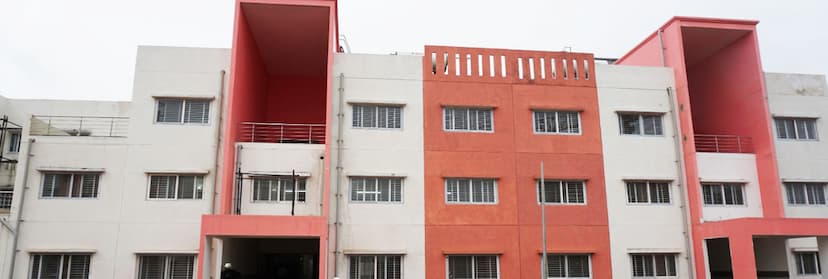NIT Andhra Pradesh revamps great BTech curriculum

NIT Andhra Pradesh has revamped its BTech curriculum and added new features as a part of the implementation of National Educational Policy 2020. The institution is also conducting a symposium (Symposium I and Symposium II) on 29 and 30 October.
The symposium being conducted by NIT Andhra Pradesh is under the banner ‘National Conclave on Strategies for implementation of National Education Policy (NEP) 2020’


Symposium II is on ‘Vision of NEP on Research and extra-curricular Parameters for holistic education’ and was inaugurated by Governor of Andhra Pradesh Biswa Bhusan Haricharan.
Addressing the event at NIT Andhra Pradesh Dr. Tamilisai Soundararajan said ‘I am glad to understand that NIT Andhra Pradesh, in spite of being the youngest among all NITs has taken essential steps towards establishment of required infrastructure, offering of lectures to students employing modern day technology and is gearing up towards reaching to the academic expectations as envisioned by the Ministry of Education, Government of India.’
Read More – Top 20 universities in Madhya Pradesh

The National Education Policy 2020 (NEP 2020) is one of the important policies framed by the Government of India with a far-sighted vision to nurture and orient the young generation in the path of development, said Dr. Tamilisai Soundarajan addressing the event at NIT Andhra Pradesh.
It emphasizes on the holistic and multi-disciplinary education for future generation, she said. Tamilsai Soundararajan further said the significant features of NEP 2020 include: building self-reliant India, offering holistic development to all citizens.


It also includes digitization of classes in Schools and Higher education institutions, equipping teachers with latest technology to strengthen best teaching-learning processes, initiation of ‘National Research Foundation’ to offer funding to deserving academicians to undertake research projects in domains of societal and technological importance, said Dr. Tamilisai Soundararajan.
Also read ‘Aditya Birla Education Academy would soon upskill 500 teachers’
I wish that education shall make you physically, mentally, and professionally successful. I also request you to practice emotional well-being ad practice harmonious ‘work-life’ balance, said Governor of Telangana.
I would like to remind everyone present to have a social responsibility to contribute towards better Nation- building. I wish with optimism that the National Education Policy 2020 offers the fullest fruits of education to all our young generation in the years to come, she said.

Governor of Andhra Pradesh speaking at the event at NIT Andhra Pradesh said a quality higher education must enable personal accomplishment and enlightenment, constructive public engagement, and productive contribution to the society.

The holistic education shall make the younger generation to be more vibrant, socially engaged, and build cooperative communities for realizing a happier, cohesive, cultured, productive, innovative, progressive, and prosperous nation, he said during the event at NIT Andhra Pradesh.
Also Read – Top 20 BSc Agriculture colleges in India
NEP 2020 recommends to follow the best practices of world class universities. The investment on Research & Innovations in India is recorded as 0.69 % of GDP which will be improved in view of NEP.
There is a need that the criticality of research is more assured than in the past, for the economic, intellectual, societal, environmental, and technological health and progress of a nation.
We are happy to learn that the policy will offer guidance to funding agencies to offer huge quantum of funds to researchers to pursue their research in addressing societal challenges such as offering potable clean drinking water and sanitation to all citizens of the country, improving quality education and healthcare, enhanced transportation, renewable energy, and upgraded infrastructure, he said.
Director of NIT Andhra Pradesh Professor C.S.P. Rao said NEP 2020 is one of the important policies framed by the Government of India with a distinct vision to orient the young generation in the path of development and righteous living.

Many initiatives undertaken by our Institute towards the implementation of the Policy in true spirits. In line with the recommendations of the policy and autonomy, the revamping of curriculum, pedagogy, assessment, and student support for enhanced student experiences is highly encouraged by our Institute, said NIT Andhra Pradesh director.
I am glad to share that the Institute revamped curriculum of UG programmes from 2020-21 academic year onward with good attractive. We are glad that this conclave will give us the best opportunity to discuss in the regard of National Education Policy 2020 and relevant developments in the institute to the stakeholders, said Professor C.S.P. Rao.
NIT Andhra Pradesh director also announced the salient features of new curriculum of BTech. The features are:
Ø Tuned as per the New Education Policy 2020
Ø Multiple exit options (Certificate, Diploma, Advanced Diploma & B.Tech)
Ø Minor Degree along with Regular Degree
Ø Honours Degree along with Regular Degree
Ø Online Education through Massive Open Online Courses (MOOCs)
Ø Choice based Credit System
Ø Skill Development through Mini Projects
Ø Outreach Activities through Engineering Projects in Community Service (EPICS)
Ø Summer Internships at Institutes/ Organizations /Industries
Ø Major Final Year Project through Industrial Training/Internship
Ø Industry Supported/Relevance Courses
Ø Interdisciplinary/Emerging Technologies learning through Electives
Ø Introduction to Foreign languages
Ø Physical Education (Sports/Games/Health)

Professor G. Ravi Kiran Sastry, Dean (Research and Consultancy), NIT Andhra Pradesh and Dr. R. Arun Kumar, Associate Dean (Faculty Welfare), NIT Andhra Pradesh are the programme coordinators of this two-day national conclave on NEP.
Dr. P. Dinesh Sankar Reddy, Registrar-in-charge welcomed the gathering and presented the overview of the two-day program on NEP. Dr. G. B. Veeresh Kumar, Dean, Student Welfare, and Dr. Karthik S, Dean, SCAIR, of NIT Andhra Pradesh introduced the Chief Guests to the participants.
Delivering the vote of thanks, Dr. T. Kurumayya, Dean, Academic Affairs expressed his gratitude to all the faculty, staff, students from various departments and sections for making the conclave a grand success and extended his thanks to the staff of Raj Bhavan of Andhra Pradesh and Telangana States for kind support.
About NIT Andhra Pradesh
National Institute of Technology Andhra Pradesh is an ‘Institute of National Importance’ and is the 31st institution among the chain of NITs started by the Government of India.
NIT Andhra Pradesh is established in the State of Andhra Pradesh during in the academic year 2015-16.
A new campus has been established with 172.6 acres of land adjacent to Chennai-Kolkata Highway (NH-16) in the air-strip lands of Tadepalligudem. Presently the institute is fully running from the permanent campus.
NIT Andhra Pradesh offers B.Tech. programmes in eight engineering branches – Bio-Technology, Chemical Engineering, Civil Engineering, Computer Science and Engineering, Electrical Engineering, Electronics and Communication Engineering, Mechanical Engineering, and Metallurgical and Materials Engineering besides M.Tech. programme in eight specializations.
The Institute also offers Ph.D. (both under Full-time and Part-time modes) programme in the above-mentioned engineering branches, Sciences, Humanities and Management, viz., Mathematics, Physics, Chemistry, English and Management, and M.S.(by Research) programme in the above-mentioned eight engineering branches.
NIT Andhra Pradesh has a total of 140 Faculty members and 2,657 students, of whom 2,299 are undergraduate students, 100 are postgraduate students and 258 are PhD Research Scholars.

The Institute is working towards implementing best practices in teaching-learning methodologies for establishing dynamic knowledge-connected society and create a conducive environment for carrying out research in multi-disciplinary areas and thereby nurturing novel thinking capabilities.
Read More – top 20 medical colleges in Kerala









